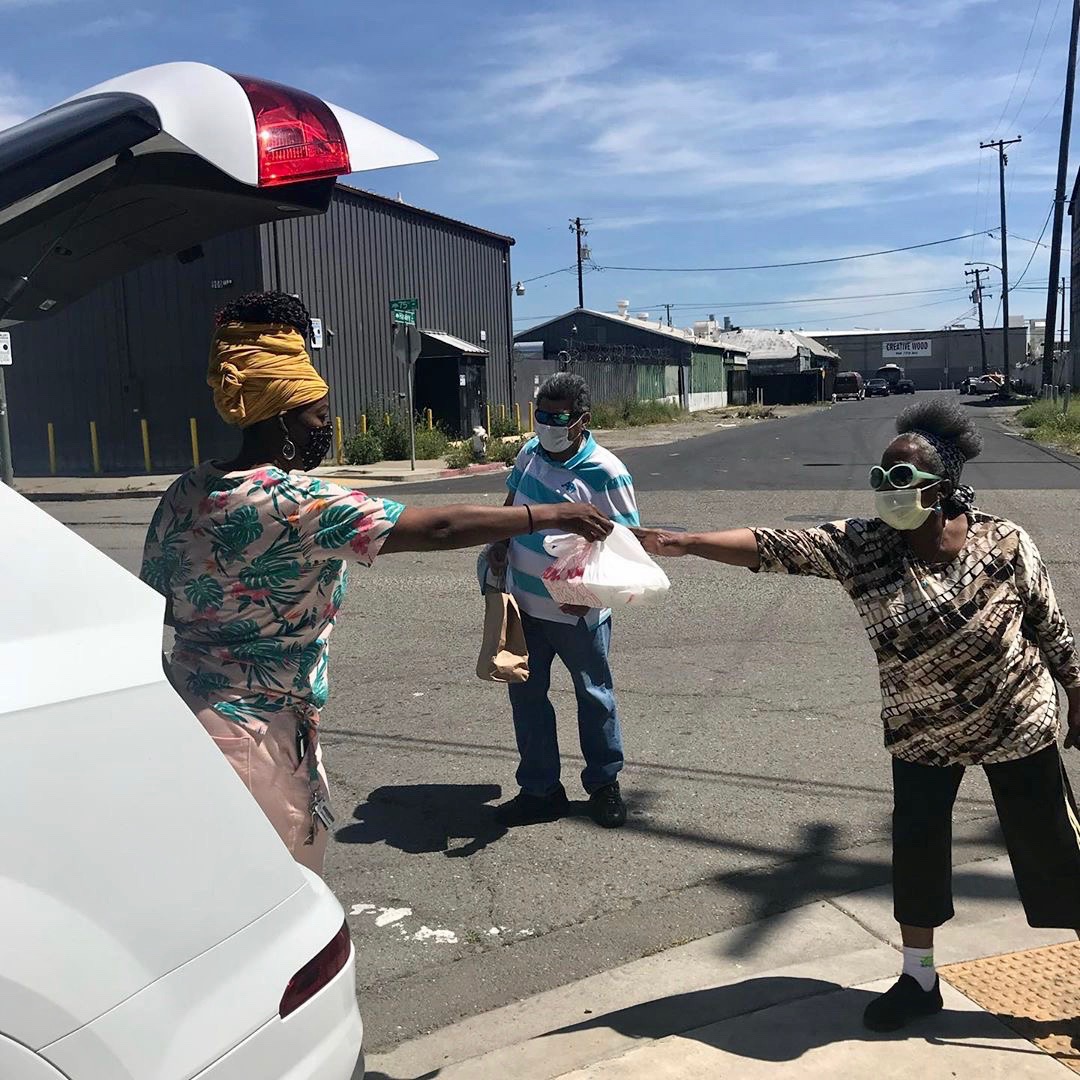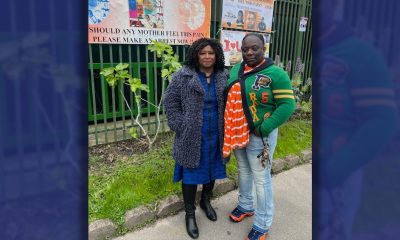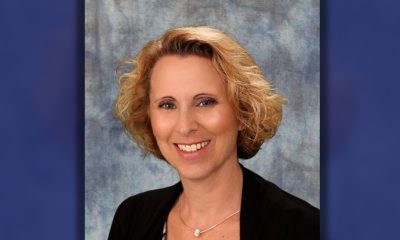Activism
Frontline Healers East Oakland Collective ‘Protectors of the Last Frontier’ Extend Food Service During COVID-19 Pandemic

Oakland has experienced high rates of displacement and gentrification of Black neighborhoods, and deep East Oakland is where the largest population of Black residents reside.
According to the 2010 U.S Census data, approximately 109,862 people live in deep East Oakland that encompasses city districts 6, 7, and part of 5, an area severely underserved, and one that suffers from long-standing disinvestment and lack of resources.
East Oakland Collective’s purpose is to get ahead of the curve of gentrification, prevent further displacement, and stabilize Black neighborhoods.
East Oakland Collective (EOC) is a member-based community organization, which is part of a consortium of more than 25 agencies called Frontline Healers, which serves communities of deep East Oakland by working towards racial and economic equity.
“Prior to COVID-19 we were already a front line rapid response agency, providing food, supplies and advocacy primarily in East Oakland,” said EOC Founder and Executive Director Candice Elder. “Since COVID-19, we had to re-imagine our programs. People throughout Oakland now need our service.”
Unfortunately, at a time when the need is greatest, EOC lost its food source, Elder explained.
“We relied on food donation from Silicon Valley caterers whose businesses have been impacted. Their loss of business caused us the loss of access to those caterers.”
EOC could no longer do its Feed the Hood and weekly hot meal distribution programs where hundreds of volunteers provided 3,000 bag lunches every six weeks and 400 hot meals every week.
“COVID-19 changed that paradigm, so we started over with one restaurant making donations — Aburaya, Japanese Fried Chicken — then more restaurants starting donating until EOC was invited to pick up food from the Community Food Kitchen program started by Lucas Tap Room. For Gov. Newsom’s first 45-day, shelter-in-place orders, we were picking up and serving food every day.
“We are now extending our services across Oakland by providing thousands of hot lunches in addition to (Personal Protection Equipment) kits,” Elder said.
EOC has expanded its service base and now serves people with compromised immune systems, low-income families of color and seniors.
EOC provides over 1,000 meals a week to over 500 residents. They deliver Monday through Friday to unhoused brothers and sisters and do door-front delivery Monday, Tuesdays and Thursdays to seniors and families that don’t have transportation.
If people wish to pick up at the EOC office they may do so from 3:00 – 4:00 p.m. on Monday, Tuesday and Thursday at 7800 MacArthur Blvd.
EOC also provides diapers, baby food, hygiene and household supplies.
EOC is supporting an emergency shelter program that is currently providing hotel rooms for over 30 seniors and families.
Elder says “We hope the community will join us in stabilizing Oakland’s most vulnerable populations, our no-to-low income brothers and sisters.”
Oaklanders who wish to assist EOC can visit the main page of their website at www.eastoaklandcollective.com for donation options. For more information Email info@eastoaklandcollective.com or call 510-990-0775.
Activism
Oakland Post: Week of April 24 – 30, 2024
The printed Weekly Edition of the Oakland Post: Week of April 24 – 30, 2024

To enlarge your view of this issue, use the slider, magnifying glass icon or full page icon in the lower right corner of the browser window. ![]()
Activism
Oakland Post: Week of April 17 – 23, 2024
The printed Weekly Edition of the Oakland Post: Week of April 17 – 23, 2024

To enlarge your view of this issue, use the slider, magnifying glass icon or full page icon in the lower right corner of the browser window. ![]()
Activism
Oakland Schools Honor Fred Korematsu Day of Civil Liberties
Every Jan. 30, OUSD commemorates the legacy of Fred Korematsu, an Oakland native, a Castlemont High School graduate, and a national symbol of resistance, resilience, and justice. His defiant stand against racial injustice and his unwavering commitment to civil rights continue to inspire the local community and the nation. Tuesday was “Fred Korematsu Day of Civil Liberties and the Constitution” in the state of California and a growing number of states across the country.

By Post Staff
Every Jan. 30, OUSD commemorates the legacy of Fred Korematsu, an Oakland native, a Castlemont High School graduate, and a national symbol of resistance, resilience, and justice.
His defiant stand against racial injustice and his unwavering commitment to civil rights continue to inspire the local community and the nation. Tuesday was “Fred Korematsu Day of Civil Liberties and the Constitution” in the state of California and a growing number of states across the country.
One OUSD school is named in his honor: Fred T. Korematsu Discovery Academy (KDA) elementary in East Oakland.
Several years ago, founding KDA Principal Charles Wilson, in a video interview with anti-hate organization “Not In Our Town,” said, “We chose the name Fred Korematsu because we really felt like the attributes that he showed in his work are things that the children need to learn … that common people can stand up and make differences in a large number of people’s lives.”
Fred Korematsu was born in Oakland on Jan. 30, 1919. His parents ran a floral nursery business, and his upbringing in Oakland shaped his worldview. His belief in the importance of standing up for your rights and the rights of others, regardless of race or background, was the foundation for his activism against racial prejudice and for the rights of Japanese Americans during World War II.
At the start of the war, Korematsu was turned away from enlisting in the National Guard and the Coast Guard because of his race. He trained as a welder, working at the docks in Oakland, but was fired after the bombing of Pearl Harbor in 1941. Fear and prejudice led to federal Executive Order 9066, which forced more than 120,000 Japanese Americans out of their homes and neighborhoods and into remote internment camps.
The 23-year-old Korematsu resisted the order. He underwent cosmetic surgery and assumed a false identity, choosing freedom over unjust imprisonment. His later arrest and conviction sparked a legal battle that would challenge the foundation of civil liberties in America.
Korematsu’s fight culminated in the Supreme Court’s initial ruling against him in 1944. He spent years in a Utah internment camp with his family, followed by time living in Salt Lake City where he was dogged by racism.
In 1976, President Gerald Ford overturned Executive Order 9066. Seven years later, the 9th Circuit Court of Appeals in San Francisco vacated Korematsu’s conviction. He said in court, “I would like to see the government admit that they were wrong and do something about it so this will never happen again to any American citizen of any race, creed, or color.”
Korematsu’s dedication and determination established him as a national icon of civil rights and social justice. He advocated for justice with Rosa Parks. In 1998, President Bill Clinton gave him the Presidential Medal of Freedom saying, “In the long history of our country’s constant search for justice, some names of ordinary citizens stand for millions of souls … To that distinguished list, today we add the name of Fred Korematsu.”
After Sept. 11, 2001, Korematsu spoke out against hatred and discrimination, saying what happened to Japanese Americans should not happen to people of Middle Eastern descent.
Korematsu’s roots in Oakland and his education in OUSD are a source of great pride for the city, according to the school district. His most famous quote, which is on the Korematsu elementary school mural, is as relevant now as ever, “If you have the feeling that something is wrong, don’t be afraid to speak up.”
-

 Community2 weeks ago
Community2 weeks agoFinancial Assistance Bill for Descendants of Enslaved Persons to Help Them Purchase, Own, or Maintain a Home
-

 Activism3 weeks ago
Activism3 weeks agoOakland Post: Week of April 3 – 6, 2024
-

 Business2 weeks ago
Business2 weeks agoV.P. Kamala Harris: Americans With Criminal Records Will Soon Be Eligible for SBA Loans
-

 Activism2 weeks ago
Activism2 weeks agoOakland Post: Week of April 10 – 16, 2024
-

 Community2 weeks ago
Community2 weeks agoAG Bonta Says Oakland School Leaders Should Comply with State Laws to Avoid ‘Disparate Harm’ When Closing or Merging Schools
-

 Community1 week ago
Community1 week agoOakland WNBA Player to be Inducted Into Hall of Fame
-

 Community1 week ago
Community1 week agoRichmond Nonprofit Helps Ex-Felons Get Back on Their Feet
-

 Community2 weeks ago
Community2 weeks agoThe Year Ahead: Assembly Speaker Rivas Discusses Priorities, Problems



















































